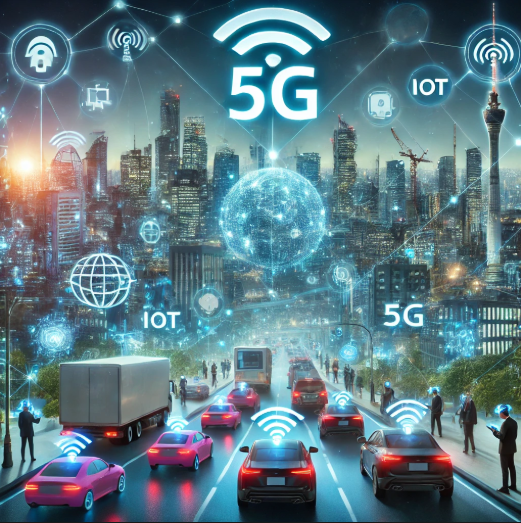5G is the fifth generation of cellular networks. It is up to 100 times faster than 4G and is opening up new opportunities for people and businesses.
With faster internet speeds, lower delays, and more bandwidth, 5G is changing how we live and work. It is helping industries grow. Furthermore making everyday experiences better, and improving society in many ways. Therefore, it can run on a broader range of bandwidths.
Things that once seemed like the future such as online healthcare, smart traffic systems. Moreover high-quality mobile gamings are now possible with 5G-Advanced.
This technology is helping us to create a safer, reliable and more endurable world.
Primary Benefits of 5G
- Faster Speeds
- More Bandwidth
- Better Coverage
- Lower Latency
- Supports More Devices
- More Accurate Location Tracking

A short comparison between 4G and 5G
These few lines can help you understand the main key difference between them
2G: focused on calls and text messages.
3G: introduced web browsing.
4G: brought faster internet, video streaming, and better mobile experiences.
Previous mobile networks were mainly designed for personal use but 5G is much more.
Furthermore, this technology in Pakistan it is designed to transform entire industries, businesses, and public services.
5G is Better Than 4G:
1.Reduced Latency:
5G reacts considerably more quickly. ensuring the seamless operation of devices like smart cars, video calls, and gaming.
2. Greater Capacity:
It can accommodate more people and devices without experiencing lag, even in congested areas,
3. Improved Mobility & Tracking:
While traveling quickly and increases location accuracy. Moreover, even then 5G maintains steady connections even
4. Edge Computing:
5G can process data closer to users, increasing speed and efficiency, rather than just depending on cloud servers.
5. Guaranteed Performance:
5G may meet a variety of needs through “network slicing,” Furthermore, guaranteeing everyone receives high-quality service.
6. AI & Automation:
5G’s cloud-based architecture facilitates automation driven by AI, advancing the development of intelligent, self-governing networks.
Furthermore, 5G isn’t just a faster version of 4G…it’s a game-changer for the future of technology!
| 5G | 4G | |
| Peak download speed | 20 Gbps | 1 Gbps |
| Peak upload speed | 10 Gbps | 0.2 Gbps |
| Latency (shortest delay time) | 1 millisecond | 10 milliseconds |
| Availability | 99.999% | 99.99% |
| Mobility | 500 km/h | 350 km/h |
| Positioning accuracy | 1 meter | 45 meters |
| Device density (per square mile) | 250 million | 250 |
The Future of 5G: What to Expect Next
5G is not just an upgrade from previous mobile networks . Moreover, it is a complete transformation. It is designed to be faster, safer, and more energy efficient.
More Energy Efficient
5G is the most energy-saving mobile technology so far. Furthermore, It helps reduce power use in networks and makes device batteries last up to 10 times longer.
New high-performance processors, like Ericsson Silicon, have also made network equipment 10 times lighter and more energy-efficient between 2016 and 2022. This helps create a greener and more sustainable future.
Stronger Security
5G is the safest mobile network ever. Security is built into its design to make it more reliable and always available.
With this strong protection, 5G can support the growth of smart technology, including automated machines, robots, and transportation systems. However, this marks the start of a new and more secure digital world.
Smarter Technology
5G introduces cloud-based networks, allowing AI-powered software to be used across the entire system from the core network to the outer edges.
With advanced AI, 5G can detect problems, manage resources better, improve service quality, and enhance security. Therefore, this makes networks faster, safer, and more efficient, creating a better experience for users and businesses.
Expand the potential of 5G technology by making the internet much faster, reducing delays, connecting more smart devices furthermore, improving city services, transforming healthcare and transportation, and opening the door for new technologies like AI, virtual reality, and self-driving cars.

Leave a Reply